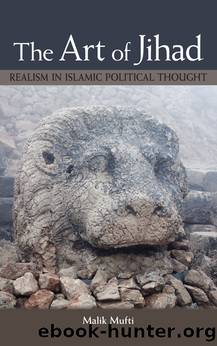The Art of Jihad by Malik Mufti;

Author:Malik Mufti;
Language: eng
Format: epub
Publisher: State University of New York Press
Published: 2019-08-14T16:00:00+00:00
Just Regimes and Just Wars
Ibn Khaldun’s concept of justice is one in which moral and political imperatives converge. Statecraft is just both insofar as it conduces to the general (as opposed to merely the ruler’s) well-being, and insofar as it is effective in facilitating the transition from a “natural” mode of rule (mulk ṭabiʿī), based on blood kinship and primal “intentions and appetites,” to more diverse and complex polities capable of nurturing the development of advanced culture or civilization. Negotiating such a transition and modulating the necessary balances requires legislation, of either divine or human origin, that can counteract the looming threats of citizen alienation and solidarity erosion, and that applies to and is accepted by all members of the polity.91 It is crucial that such legislation be genuinely solicitous of the general welfare—in short, just—because only then will the ruled, who are treated with consideration by the ruler, in turn be “infused with love for him, and will fight to the death under him against his enemies,” and thereby sustain the polity’s drive toward advanced civilization.92
Unfortunately, the actually prevailing modes of rule, in Muslim and non-Muslim states alike, fall short in this regard because they continue to be based on the interests of rulers who display disdainful arrogance by treating the interests of their subjects as secondary.93 This is true even of regimes established by intelligent rulers who draw on historical lore and philosophical insights in an effort to maintain their hold over their subjects. As long as the general welfare remains subordinate, even the gratification of material needs will not suffice to stave off the engines of decay that cut short the life spans of such regimes.
Nevertheless, Ibn Khaldun points to two additional—albeit rare—regime types that are capable of securing popular legitimacy, and therefore capable of sustaining, for prolonged periods of time, a broader or “greater” ʿaṣabiyya that can bind the populace together effectively in pursuit of common ends and in resistance to common enemies. One is a regime based on legislation formulated by the lawgiver through the exercise of his own reason, attending both “to the common interests in general, and to the interests of the ruler as they relate to the rectitude of his rule in particular.”94 Ibn Khaldun emphasizes that he is speaking now not of the ideal political regime of the philosophers, in which citizens attain a perfection of soul and character that allows them to dispense with rulers altogether—such utopias are presented by the philosophers merely as heuristic hypotheses or suppositions. The type of rational regime (siyāsa ʿaqliyya) he has in mind here, in which the interests of the ruled are not subordinate, is not a mere utopia. It can and has been realized in deed. Echoing al-Farabi and Ibn Rushd, he provides an actual example: “This was the regime of the Persians.”95 That is why their empire was so large and long-lasting, and their civilization so advanced.
Ibn Khaldun hastens to add, however, that with the call to Islam God has made this kind of regime “superfluous for us.
Download
This site does not store any files on its server. We only index and link to content provided by other sites. Please contact the content providers to delete copyright contents if any and email us, we'll remove relevant links or contents immediately.
| Hadith | History |
| Law | Mecca |
| Muhammed | Quran |
| Rituals & Practice | Shi'ism |
| Sufism | Sunnism |
| Theology | Women in Islam |
The History of Jihad: From Muhammad to ISIS by Spencer Robert(2207)
Nine Parts of Desire by Geraldine Brooks(2007)
The Turkish Psychedelic Explosion by Daniel Spicer(1988)
The First Muslim The Story of Muhammad by Lesley Hazleton(1881)
The Essential Rumi by Coleman Barks(1631)
The Last Mughal by William Dalrymple(1570)
Trickster Travels: A Sixteenth-Century Muslim Between Worlds by Davis Natalie Zemon(1544)
1453 by Roger Crowley(1466)
by Christianity & Islam(1347)
God by Aslan Reza(1333)
A Concise History of Sunnis and Shi'is by John McHugo(1276)
Muhammad: His Life Based on the Earliest Sources by Martin Lings(1272)
Magic and Divination in Early Islam by Emilie Savage-Smith;(1197)
The Flight of the Intellectuals by Berman Paul(1180)
No God But God by Reza Aslan(1155)
Art of Betrayal by Gordon Corera(1131)
What the Qur'an Meant by Garry Wills(1120)
Getting Jesus Right: How Muslims Get Jesus and Islam Wrong by James A Beverley & Craig A Evans(1080)
The Third Choice: Islam, Dhimmitude and Freedom by Durie Mark & Ye'or Bat & Bat Ye'or(1068)
